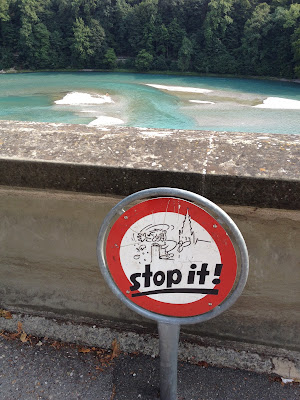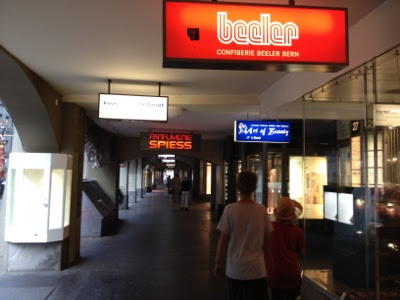Two or three times during our trip a city, mountain, lake or meadow got under our skin (in the Frank Sinatra way, not a Washington politician way), and Bern, Switzerland was one of those places. Maybe it was because our trip was fast approaching the end, or maybe it's because Bern is a world-class city in its own right, but at the end of the day it doesn't matter, because for whatever reason Bern makes everyone--even the boy--smile whenever we mention it.
Bern:
When we arrived in Bern on August, 21st we had less than 24 hours left in Europe and that was probably alright since a person can run out of money faster in Switzerland than just about any other place on the planet. The truth is that Switzerland is idyllic and it can even be affordable if you trade houses with a resident (our next plan); you're lucky enough to have friends living there (the case for us in Basel in 2007); you're camping with a tent that doesn't fly as easily as ours (http://wirthsummer2012.blogspot.com/2012/06/insomnia-and-flying-tents.html), or you don't mind staying in a youth hostel.
You may wonder why non-youths would stay in a youth hostel, and the strange truth is that most hostels in Europe accept people of all ages and, as far as we know, your presence won't give the youths a creepy vibe the way single middle-aged men do at Disney World. In some cases, hostels provide private bathrooms and/or private rooms for single people, couples and families. Our family room in a converted convent inside the historic walls of Lucca, Italy provided a lockable room with six beds and a private bathroom for 100 Euro per night (our thanks to Rick Steves for this suggestion), and our hostel in Bern (Bern Backpacker's Glocke) provided a lockable room with four beds and a sink. The bathroom was just across the hall, and this never presented a problem for us or the kids. The hostel was also perfectly located in the historic center of Bern (see below), though it cost 180 of our last 200 Euros.
 |
| View from our room in the Backpacker's Glocke Bern |
One-hundred and eighty Euro seems like a lot of money, and it is, but it is much cheaper than the 400 Euros charged for the average Bernese hotel. I just did a search on Booking.com (where we found the hostel) to see if the rates for two adults and two children are any cheaper in April, 2013, but they're not if you have less than a week's notice (like we did) and you want to stay near the historic center of Bern (which we strongly suggest you do).
There's a large vehicle restricted area around the historical center of Bern which we know firsthand because we took the tour of its boundaries while attempting to find the underground parking area nearest our hostel. I know we've mentioned packing light before and I'll devote a blog entry to what we packed and what we should have packed, but when you're walking five to ten blocks, you'll be glad to have one or two backpacks containing everything your family needs for the night. Additionally, when you discover that there's no early check-in and you need to carry all of your things to a restaurant with you, you'll be even more grateful for packing light.
Eating a late lunch outside in the historic section of Bern, Switzerland at the end of a two month trip can seem other-worldly. By this time, you can order a pitcher of water in a rapid succession of German while pulling out your chair, stowing your bag, and preparing to answer just about any question the waiter asks. You will also look at your children strangely when they order with a similar confidence, happily returning to the language of June. However, when they correct your German or tell you you said "thank you" in French, then roll their eyes, they've gone too far. I've often said that it's hard for a Midwesterner to raise East Coast kids. As someone whose childhood vacations consisted of getting lost in Toledo, Ohio at 2 AM, it's also hard to raise kids who are snobby in Switzerland on your dime.
After our expensive lunch (which we charged for lack of available cash), we ran to Einstein's apartment which sits on a street of green-tinted buildings over covered sidewalks, fronting businesses on the first floor (see below).
My husband has been anxious to see Einstein's house since the seventh grade (he swears this is true), so touring Einstein's home dictated the time of our arrival in Bern and visiting Bern at all. Therefore, it was with great displeasure that we found the following sign upon darting up the stairs in Einstein's building:
Sorry, I meant this sign:
So, the apartment was closed for water repairs, though the ice cream store on the first floor was open (see below), and may have provided some restorative properties had some people in our party not felt too upset to stop.
If you find yourself in Bern with a husband who's too disappointed to eat ice cream, or talk to anyone, or reflect on the clock at the end of the street which inspired Einstein to think of time as relative (I looked at the clock and thought of it as beautiful and--with less than 24 hours left in Europe--time as our enemy, but I never purported to have a mind as powerful as Einstein's... publicly.), there are a few options...
...You can distract him by walking down the street, rather than the protected sidewalk, and dodging the extremely quiet trains...
...or you can walk to the Cathedral and figure out what everyone's talking about...
...Or walk to the Swiss Parliament and enjoy the fountains...
...You cross the bridge and visit the bears which gave the city its name...
...and threaten to throw him in. Or you can walk to the river where you hear yelling and jumping from a nearby bridge (see teenagers standing on the far bridge pre-plunge)...
...You'll see older people swim past you from this position and if you follow the trail upriver, you'll see their place of origin near the dam....
...and if all of that doesn't fix his attitude, you really just need a new husband.
What's interesting about the men who are stripping off their clothes and jumping into the river upstream is that these are some of the same people you saw earlier wearing dark dress pants, ties and short-sleeved white business shirts. You'll remember them because you dodged them like trolleys while mentally preparing all the reasons you'd list if approached and asked to convert to their religion. After passing a couple-dozen similarly clad men, we determined that they were not, in fact, Mormons (or at least Mormons who were good at their jobs), rather, just businessmen who didn't get the 1983 memo downgrading short-sleeve dress shirts from the "good fashion sense" list. You may be thinking that long-sleeve shirts make no sense on a hot August day and that's just as true as stilettos make no sense on cobblestone streets... or any streets at all really... well, maybe some streets, but I don't walk those streets... at least not after midnight. Anyway, my point is that fashion doesn't usually make sense, but you still have to follow the rules or be mocked by sassy American tourists who incidentally wear flats.
After sitting near the dam for a while, we convinced ourselves that downstream was the place to be. So we walked toward the bridge jumpers until the street lights switched on and the swimmers disappeared against the water with only their laughter giving away their position.
Later, we walked the streets of Bern until everyone was exhausted and a shower and bed seemed our only future. Cafe goers below kept us company until rain chased them away at 2am. Then, the street cleaners arrived, removing all traces of the party in which the famously conservative Swiss engaged on a "school" night.
The Bernese Oberland:
The next morning, we regrettably left Bern and took the long route to Zurich Airport through the Bernese Oberland. There was only time to stop once or twice and shoot pictures like the below, but we comforted ourselves--and each other--by promising this was only a reconnaissance drive, and we'd be back.
This may not be true of everyone, but Switzerland just feels like home to me. I've mentioned my fondness for Heidi before (http://wirthsummer2012.blogspot.com/2012/06/places-we-were-too-grumpy-tired-or-cold.html) and I must admit that I watched that movie young enough to think I was her in a previous life. Yes, I know that you can't be a fictional person in a previous life. It makes no sense at all! But that does nothing to remove the idea that if I hike up the right mountain fast enough, I may still find my grandfather at the top.
So, it's fitting that Zurich brought us into Europe and then it brought us back home http://wirthsummer2012.blogspot.com/2012/08/arriving-home.html
The End Aside:
I know I promised to finish this blog before Thanksgiving, then again before Easter, but I found procrastination appealing in that it prolonged our connection with this trip. I was also sometimes lazy... and after January I was watching Downton Abbey... and how could I say goodbye to Sybil, Matthew, and our trip at the same time? I just have two more posts to add to this blog before I call it quits and those are "Culture Shock" and "Packing: What to Bring and What to Leave." I have no idea when I will finish these and am resisting the urge to say "before summer for sure."
Author of: Letters to Salthill
























































